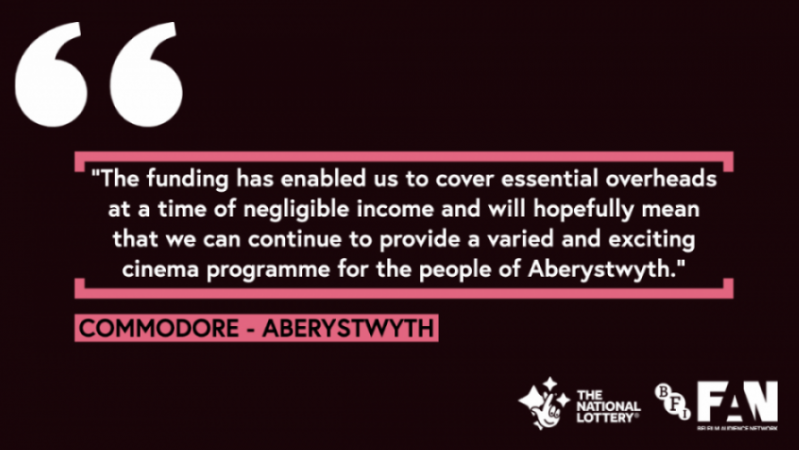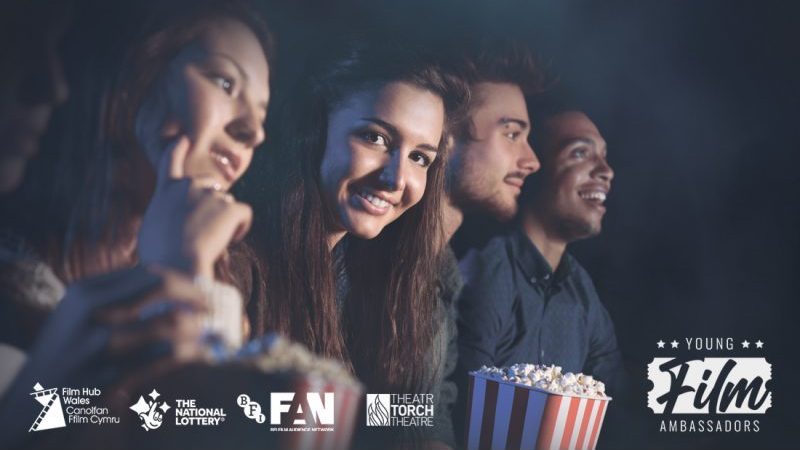
Put yourself in the picture as a Young Film Ambassador with the Torch Theatre
Are you aged between 14 to 18, with a passion for cinema and a desire to learn more about different aspects from across the film industry? This week, Milford Haven’s Torch Theatre have launched a fresh new scheme for teenagers from across Pembrokeshire who are interested in or have a passion based around film and cinema.
Commencing from the end of March 2021, the Torch Theatre Young Film Ambassadors scheme is an unmissable opportunity for teenagers to experience film in a fun and educational way; become a budding film critic, meet like-minded people and to make new friends. You will discuss and review films with your peers, get your reviews seen, and sharpen your skills as a reviewer as you explore writing and vlogging as part of the project.
As a Young Film Ambassador, this exciting, interactive project offers you the opportunity to watch and review current British, independent and blockbuster films. You will find out more about film with filmmaking and film studies digital workshops, with guest speakers and special presentations from industry insiders and creatives on aspects from production to publicity. Access to the films will initially be through digital streaming platforms, and then back on the big screen once the Torch is fully reopened.
The Torch Theatre’s Young Film Ambassadors scheme has been made possible by National Lottery funding distributed by Film Hub Wales, through the BFI FAN Film Exhibition Fund which was awarded to the Torch in the Autumn of 2020.
Alex Lloyd, Senior Manager – Marketing, Press & Communications at the Torch said:
The Young Film Ambassadors scheme is a fantastic opportunity for budding film enthusiasts to learn more about films and cinema from across different aspects of the industry. We will initially run the scheme online until it is safe to return to the Torch which will then give a deeper insight into what we do. I would like to thank Film Hub Wales, BFI FAN and the National Lottery for their support in allowing us to create this scheme for our younger audience members in the Pembrokeshire community.
Want to get involved? To apply to become a Young Film Ambassador, simply email [email protected] with the following information: Name, Age and Location, plus tell us what your three favourite films are and why. Successful Ambassadors will be contacted by 15 March 2021. For more information, visit the Torch Theatre’s website.
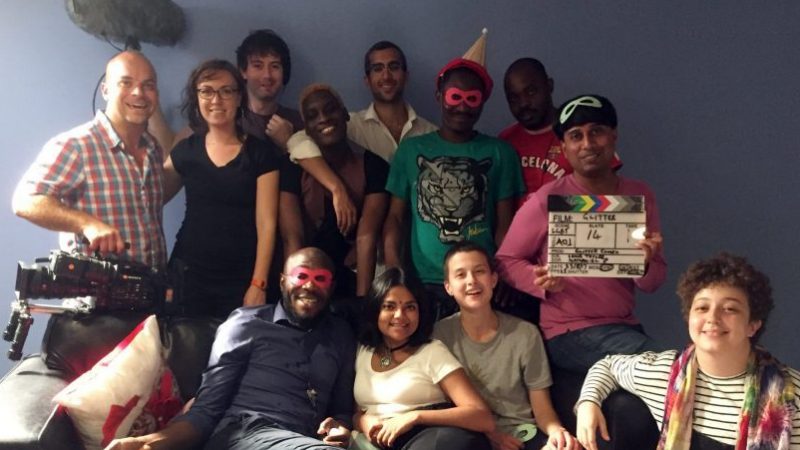
Iris Prize celebrates National Lottery award to support ambitious three-year project
Organisers of the Iris Prize have launched a Wales-wide, three-year project working with community groups from across the country to discuss issues faced by LGBT+ people.
The Iris Prize successfully applied for £195,330 from The National Lottery Community Fund.
Working with the LGBT+ community and their allies, the team are looking for community groups who, thanks to the support of National Lottery players during these challenging times, will produce a film addressing issues faced by the LGBT+ community. All of the completed films will be available to watch online.
The Iris Prize intend to build on their previous Iris in the Community project, creating more opportunities for community members to make films that relay a campaign for change.
Team Iris will be working with 10 community groups to discuss issues faced by the LGBT+ community and produce a film in response. Beneficiaries will have opportunities to take part in acting workshops, and gain skills in filmmaking and scriptwriting. The groups involved do not need to work within the LGBT+ community, but will be diverse in their membership, for example welcoming people with learning disabilities.
Berwyn Rowlands, Festival Director, commented:
Without this funding from The National Lottery Community Fund we would not be able to run this project. We have been inundated by community groups across Wales asking if we could work with them, today we can confirm, with a very BIG YES!
“2020 marks the 20th anniversary of the repeal of one of the most controversial pieces of legislation to impact on the lives of LGBTI+ people in the UK: Section 28 of the Local Government Act 1988.
“This is a fabulous opportunity for our community groups to take stock and reflect on where we are today as LGBT+ people. The fact that we will have 10 films produced at the end of this project is an added bonus. Film continues to be a very democratic way for people to share their ideas and to reach new audiences. Our community groups will I’m sure benefit from this amazing experience.”
Community groups who are interested in discovering more should start with a visit to Iris Prize Community where they can complete a form to express an interest.
Derek Preston-Hughes, Funding Manager at The National Lottery Community Fund said:
“We are delighted to be able to support The Iris Prize with this project. They have already played an incredible role in addressing issues faced by the LGBT+ community over the years, and it’s great that they can now build on this, thanks to National Lottery players. Projects such as this are making a huge difference to people’s lives and to communities across Wales.”
National Lottery players raise £30 million each week for good causes throughout the UK. To find out more about applying for a grant from The National Lottery Community Fund to help your community adapt, recover and thrive, visit The National Lottery Community Fund website.
The main festival sponsors are: The Michael Bishop Foundation, Welsh Government, the BFI awarding funds from The National Lottery, Ffilm Cymru Wales, Film 4, University of South Wales, Co-op Respect, Bad Wolf, Gorilla Group, Peccadillo Pictures, Pinewood Studios, Attitude Magazine, Diva Magazine and The Ministry of Sound.
The festival also works in partnership with BAFTA Cymru, Pride Cymru and Stonewall Cymru.
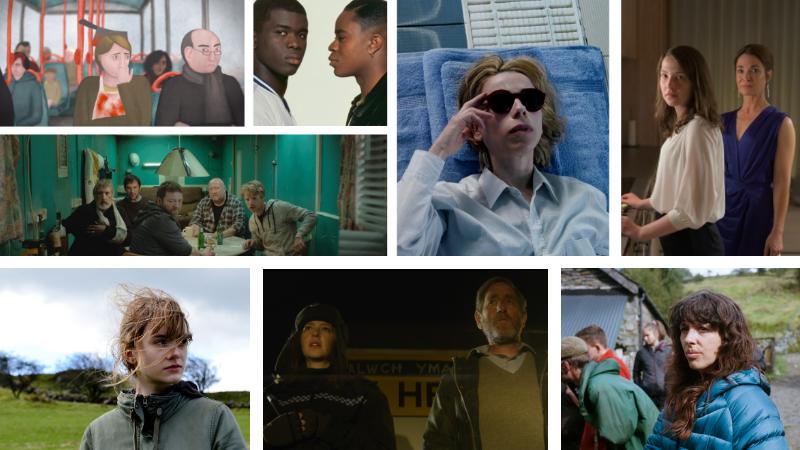
Film Hub Wales appoints new Made in Wales Officer to champion Welsh film
Film Hub Wales (FHW) has created a pioneering new role,
dedicated to the promotion of Welsh films and the cinemas that screen them.
Radha Patel joins the team as the Made in Wales Officer at a critical time, as the film industry plans for a future beyond Covid19. Supported by funding from Creative Wales and developed in consultation with the Welsh screen industry, this innovative new role will explore ways to develop audiences for films with Welsh connections.
Hana Lewis, Strategic Manager of FHW explains:
The film industry has faced immense challenges during the pandemic, from long term cinema closures and festival cancellations, to delayed release schedules. Anticipated Welsh films such as Andy Goddard’s Six Minutes to Midnight starring Judy Dench and Euros Lyn’s Dream Horse starring Toni Collette, are just two examples of films impacted, losing crucial box office income but also a chance to celebrate Welsh stories. We are delighted to welcome Radha to our team, to a role which can support these and many other releases as they explore new pathways to reach audiences.
The role was developed in conjunction with FHW’s Made in Wales strategy which has been working to celebrate Welsh language, culture and heritage on screen since 2014. Over 700 films with Welsh connections are featured on the FHW website, along with an online preview room for film programmers and an option for filmmakers to submit their films for promotional support. Most recently, FHW undertook research into potential for a Made in Wales brand, which could be used as a symbol to promote Welsh film internationally.
Gerwyn Evans, Deputy Director, Creative Wales said:
“We look forward to the recovery of our creative industries in 2021. Films have played such a key role in keeping us entertained at home during 2020, but we look forward to audiences packing our cinemas once again. In Wales we have a rich heritage and strong track record of film, with many local cinemas waiting to welcome back audiences. We wish Radha every success in this key role with Film Hub Wales promoting Welsh films and cinemas.”
Claire Vaughan, Programme Manager for Chapter Arts Centre in Cardiff says:
“We are very excited for Radha Patel begin work on this important role that will help promote Welsh film. This post will enable us to connect more filmmakers with audience members who are eager to hear Welsh stories. Radha is a talented artist who places emphasis on how we explain ourselves with stories and her warm approach to audiences and professional manner with stakeholders makes her a great appointment to the role.”
Radha’s previous roles include Communications Officer at Age Cymru and Projects and Outreach Officer for Gentle/Radical, a grassroots socially engaged arts organisation based in Cardiff. Radha has a background in audience development and is passionate about ensuring that cinema is accessible to and representative of all.
Radha adds:

“I’ve always been passionate about cinema, and making sure that it’s accessible to all. As the Made in Wales Officer, I feel honoured to continue doing this by making sure films produced in Wales, or that have Welsh connections, receive the attention they deserve from audiences nationally and internationally. Wales is home to incredibly talented crews and production teams, filmmakers and writers, actors and talented individuals working all year round to bring compelling narratives to life. To truly champion them, we also have to champion Welsh audiences because the stories we tell belong to us all.”
FHW are led by Chapter as part of the BFI Film Audience Network. Thanks to National Lottery funding FHW delivers a wide portfolio of activity annually, bringing more films, to more people, at more cinemas and film festivals across Wales.
Ends.

Inclusive Cinema tasks cinemas to take anti-racist action with launch of new guide
Inclusive Cinema tasks cinemas to take anti-racist action with launch of new guide
The BFI Film Audience Network’s Inclusive Cinema has launched a practical guide for improving the cinema experiences of ethnically diverse audiences, and staff, which challenges institutions to make good on their Black Lives Matter and anti-racism statements from 2020.
Inclusive Cinema is a UK-wide project funded by the BFI Film Audience Network (FAN) through the National Lottery to support exhibitors in welcoming everyone to participate in cinema, by countering cultural, systemic or physical barriers. The new guide ‘Dismantling Structural Inequality in Your Cinema’ was commissioned from artist and freelancer Sadia Pineda Hameed and focuses on the cinema experiences of ethnically diverse people, with reference to intersections including gender, sexuality, disability, income and class.
From immediately actionable tools, to encouraging inner, reflective and dialogue-based work towards undoing systemic injustice, the guide is intended to create lasting change for future generations, and sustain organisations in a meaningful way, cited by its writer as “the last toolkit that cinemas should need” when it comes to making their spaces truly inclusive of and led-by ethnically diverse people.
Speaking at film exhibition conference, This Way Up, in December 2020, Sadia Pineda Hameed, author of the guide said:
This toolkit wants to help you within your cinema or organisation to dismantle historic, powerful and violent structures; it’s not about reforming a single workplace but actually creating a more sustainable sector. It’s about decolonisation not diversification. The toolkit does not prioritise visible diversity and inclusion, but prioritises making sure exclusion can’t exist in your space … Share it with your funder and ask your funder to hold you accountable to it, and vice versa.
The toolkit examines the role of cinemas in the context of systemic injustice and focuses on preventing harm towards people of colour as audience members, staff and creators who exhibit their films, and arrives in tandem with Dogwoof’s latest release, charting Martin Luther King Jr.’s mistreatment by the FBI, MLK/FBI, available in virtual cinemas and on demand, from 15 January.
As audiences connect the dots between the seeds to Black Power rising from the ‘50s and ‘60s, to Black Lives Matter in 2020, the vital reminder is that institutional and structural racism are still endemic issues within our society and culture, requiring multiple strategies and committed action.
Toki Allison, BFI Film Audience Network Access Officer, who oversees the Inclusive Cinema project, explains:
“Many cinemas have made statements recognising that structural change is essential after the resurgence of Black Lives Matter bringing racism forcibly into the public consciousness in 2020. This toolkit provides short and long-term actions for organisations to take, to show their true commitment to not only making statements, but taking anti-racist action to create an equitable space for Black, Asian, and ethnically diverse talent, curators, staff and audiences. It’s a comprehensive and inarguably uncompromising document, but it will only be effective if organisations take it, absorb it, recognise the deep work that needs to be done, and get on and do it. I’m looking forward to seeing real change happen, including true accountability from white-led organisations who give up their power and make way for ethnically diverse leaders, makers and curators to share stories in their own ways.”
Rico Johnson-Sinclair, director and founder of CineQ, and festival manager at SHOUT Festival, was consulted in the creation of the toolkit, and said:
“There’s been a bit of work in the film industry generally over the last couple of years. And whilst this work is formative, it’s still optional and very base level. While the industry is debating whether or not to even implement systems of equality within their organisations, people of colour from all perspectives are put on the backburner time and time again, in lieu of something, anything else, that seems to take priority due to its rise in the public sphere. As this happens, whole generations of black and brown storytellers, creatives and hard-working film-lovers are cast aside to protect a casually and subversively racist status quo. This toolkit not only helps organisations to acknowledge systemic racism happening in their backyards (within a film industry that was built during a time where the only representation we had was given to us by white people), it also shows us a path to valuable self-learning; to implement change across the team to ensure that as the conversation changes and evolves amongst marginalised people (which it will inevitably do), organisations are able to keep up. Instead of performative, this toolkit champions the formative and sustainable.”
Alex Misick, programme coordinator at The Centre for Contemporary Arts, Glasgow, who have begun the work to structural change in their venue, said:
I like how the guide doesn’t pull any punches, and is quite explicit about the politics that underpin so much of what hopefully, should be a historic approach. One of Sadia’s key points is that this isn’t just a strategy to be implemented from the top-down of an organisation. These are conversations that need to happen between staff, not necessarily led by senior management, and to be implemented at an individual level… Instead of following capitalist logic of doing more, this is a moment to take a step back, and to recognise there’s a rupture in consensus and let’s not go back to normal.
You can find the toolkit in the how-to guides section of the Inclusive Cinema website here and/or download it here.
You can find virtual screenings and on demand links to watch MLK/FBI here.
Ends.
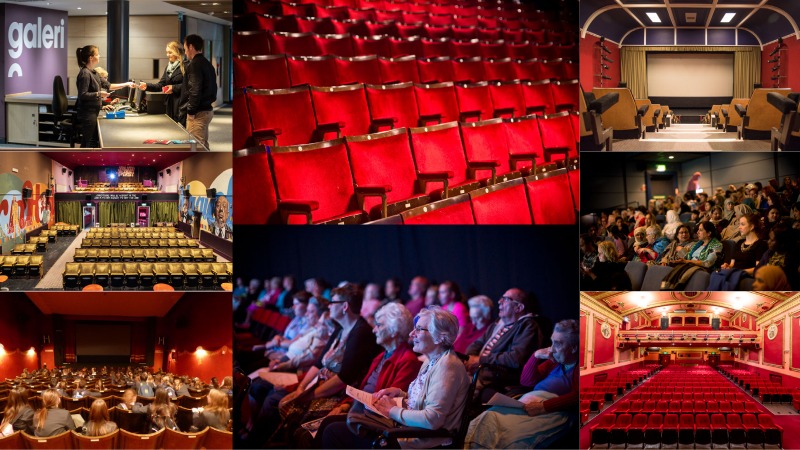
Film Hub Wales awards £52,000 in Covid-19 recovery funds to Welsh cinemas and festivals
Media Release:
Film Hub Wales awards £52,000 in Covid-19 recovery funds to Welsh cinemas and festivals
Film venues put wellbeing at the forefront of their post-Covid-19 reopening programmes.
Film Hub Wales (FHW) has awarded £52,000 in National Lottery funding, through the BFI FAN Film Exhibition Fund, to 15 Welsh independent cinemas and film festivals as they plan for reopening.
Funds will be used to aid recovery, enabling venues to safely restart British and international film screenings, including through cabaret style seating and ‘big screen bubbles’, so that they can reconnect with the most isolated Welsh communities affected by lockdown.
Socially-distanced film activities will take place Wales-wide, creating safe spaces where people can still travel the world via the big screen, at affordable prices. Audiences will be at the heart of decision making, with their feedback valued by venues as they rebuild.
For example, TAPE in Old Colwyn is reinstating Sofa Cinema and will screen Sanctuary in partnership with a new local dating agency for people with learning disabilities. In Barry, the Memo Arts Centre will create ‘big screen Bub-L’ activities with digital and take-away crafts, and in Tywyn the Magic Lantern will ‘re-light the magic lantern’, positioning the cinema as a bold, brave beacon for the future.
Since the pandemic began, many sites have been unable to open their doors to the public. With an uncertain future still ahead, they have been working to diversify their business models, develop robust health and safety procedures and secure critical alternative sources of income.
Hana Lewis, Strategic Manager of Film Hub Wales explains:
We need to recognise the impact of cinemas in our communities and the potential loss we will all face if they close as a result of the pandemic. From Neuadd Ogwen, which provided food to 600 people via its foodbank, to the Magic Lantern and Theatr Gwaun, which both delivered medical supplies and mental health support to vulnerable patrons, independent venues have gone above and beyond to help those in most need. They have done this whilst also planning for their own uncertain futures, interrogating their business plans, reviewing their approaches to access and equality and exploring environmental sustainability. These funds will help them to restart crucial social, economic and cultural provision through on-screen activity.
Annie Grundy, Co-Director of The Magic Lantern:
Getting this funding enables us to wrap a big ball of cotton wool around the British, independent and foreign language films in our programme which in the old days before the corona-coaster we underwrote ourselves. It ensures that even with a much reduced capacity (we have gone from 280 to 36 available seats due to social distancing) our audience can rock up to see an eclectic mix of fantastic films on screen at the Magic Lantern.
Sue Whitbread, CEO of Theatr Gwaun adds:
Film Hub Wales’ support means we can move ahead with our new film strategy. Theatr Gwaun will now focus on diverse, independent films refreshing interest and developing new audiences in our community. Funding is essential, but equally the expert advice, mentoring and enthusiasm of the Hub team has given us a tremendous boost.
Blanche Giacci lives a few streets away from Theatr Gwaun and in normal times would attend screenings at least once a week:
Theatr Gwaun is an essential part of our community, providing cinema, culture and entertainment for all age groups and interests. It is a social hub which improves the community’s well-being.
Ben Luxford, Head of UK Audiences at the BFI adds:
This year has shown the absolute importance and need of programming beyond the mainstream, and we’re pleased to be able to support exhibitors in Wales continue to do that.
The BFI FAN Film Exhibition Fund is made possible thanks to National Lottery funding, repurposed by the British Film Institute (BFI) via its Film Audience Network (FAN). The fund offers critical relief and business continuity to exhibitors across the whole of the UK. Funds in Wales are administered by FHW via Chapter as the Film Hub Lead Organisation.
Ends
Download the Press Release
Left to right: Galeri Caernarfon, Memo Arts Centre Barry © Jon Pountney, Theatr Gwaun, The Magic Lantern © Mathieu Gasquet, WOW Women’s Film Club © Jon Pountney, Wicked Wales Tir Morfa Awards, Memo Arts Centre Barry WAM © Jon Pountney, Monmouth Savoy © David Broadbent

YourScreen: Virtual Cinema Offer
‘Open your doors’ during lockdown and let your audience watch films – mostly new and unavailable on other digital platforms – on YourScreen.
By promoting YourScreen, you will be earning revenue now and well into the future.
What is it?
YourScreen is your virtual cinema, a short-term solution to keep you going during the pandemic. It also provides a long-term opportunity to add an extra screen to your film programme – to appeal to new audiences and to generate additional revenue without the overheads.
How does it work?
For every virtual ticket sold, YourScreen will pay you 30%.
Participation is simple:
– They will provide you with a promo code which will give you audience 25% off ticket purchases.
– You promote the films on your website / social media / e-shot.
– At the end of the season they will send you a sales report and an invitation to invoice them for 30% of all purchases made.
If you participated in YourScreen season one, your existing promo code will be valid for season two.
Contact:
Please get in touch to learn more: [email protected] or visit their website.
Current deal:
Season Four will be available from from 23 July until 19 September
Films available:
- Summer Survivors
- Time For Love / Kolej na milosc
- The Outside Story
- Those Who Remained / Akik maradtak
- Window To the Sea / Una ventana al mar
- Calamity / Calamity, une enfance de Martha Jane Cannary
- But Beautiful
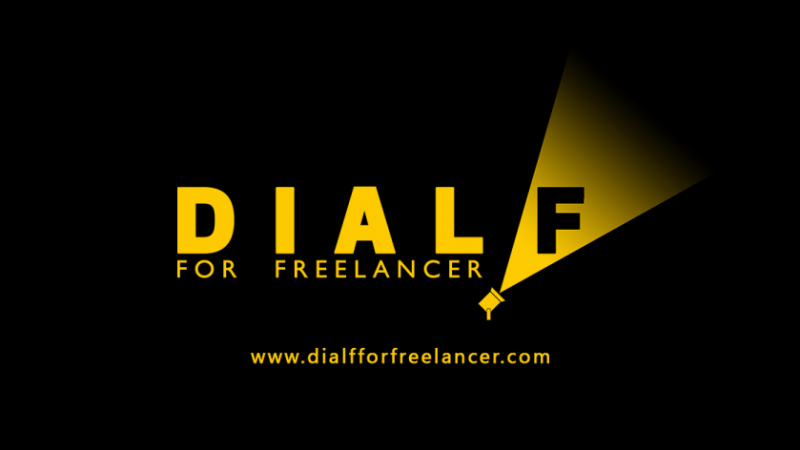
Dial F For Freelancer Launches Online, Making Space for Valuable Voices in Film Exhibition and Distribution
Thursday 8th October 2020: A network boasting over 250 members has unveiled their dedicated space celebrating the massive talents represented by the freelance cohort of the UK’s film exhibition and distribution sectors. Dial F for Freelancer is led by film freelancers for their peers, sharing past projects and reaching potential clients. Dial F for Freelancer is the first of its kind and the only dedicated space for freelancers working in film distribution and exhibition.
The current unfolding news regarding the future of film exhibition highlights the pressing need for this platform to exist. Whilst the film industry relies on freelancers, there are currently no formal structures to support them collectively:
“…more than half of the industry workforce are freelancers or mix freelance work with periods of employment. Freelancers are the lifeblood of our industry, yet they don’t have access to the benefits, security or workplace support of permanent employees.” – The Whole Picture Programme Report – The Film and TV Charity, 2020
The Dial F for Freelancer platform has been developed with the needs of freelancers at the forefront to celebrate the sector’s unique skills. The founding members are looking to reduce the barriers and labour to finding paid work by creating an ever-growing network of freelancers.
The grassroots-led project places the platform in the hands of the users rather than a third party. Users control their pitch and profile, choosing the projects of which they’re proudest to showcase. Members of Dial F for Freelancer are also supported with resources, contacts and opportunities to collaborate.
The origins of this concept began during discussions at This Way Up 2019 (the UK’s film exhibition industry conference), a sidebar talk for freelancers led by Toki Allison spoke about the need for an informal network to be created to provide peer to peer support and reduce the feelings of isolation which are prevalent in freelancing. In March 2020 as freelancers began to lose work due to the pandemic, Allison, along with Moira McVean and Jo Taylor-Hitchinson decided to make the network a reality.
Initially a Facebook group set up to support freelancers affected by the onset of the lockdown attracted over 250 members and the trio realised a more formal platform was needed. They were awarded a Community Grant from The Film and TV Charity and have gained further industry support which has allowed them to create the Dial F for Freelancer platform.
The Dial F for Freelancer Steering Group, comprising eight freelancers working in the sector, have worked with a developer to design and launch Dial F For Freelancer to the industry.
This project has been supported by The Film and TV Charity’s Community Grants, a fund from the Film Distributors’ Association, and with further contributions from film distributors, including Altitude Film Distribution, Bohemia Media and eOne. The new platform endeavours to celebrate the wealth of talent and expertise represented across the network, whilst also creating a warm and welcoming space for freelancers working in exhibition and distribution to build their profiles and networks in an effective and easy way. They also plan to build a collective public presence and signpost available support for members.
Jo Taylor, co-founder of Dial F for Freelancer said:
My freelance career has been powered by collaboration and with the invaluable support of my peers. Creating a network such as this has been an aspiration of mine for a long time and so it’s gratifying to be working with colleagues and supporters who feel the same. It is so exciting to see Dial F for Freelancer come to fruition giving our sector the spotlight it deserves.
Andy Leyshon, Chief Executive, Film Distributors’ Association said:
The varied nature of the films FDA members distribute are often reliant upon project-focused freelance expertise across film booking, marketing and publicity specialities. Freelancers have been hit especially hard across the film ecosystem lately and we are pleased to support this worthwhile initiative during these challenging times.
Mark Jones, Head of Publicity, Altitude Media Group said:
Freelancers have played an integral role in several of Altitude’s releases and it’s been brilliant for us to be able to collaborate with a range of dynamic individuals. We know one of the greatest challenges of freelancing is the absence of close knit ‘colleagues’ to introduce new ways of thinking, building skills and further opportunities. Dial F for Freelancer is the perfect dedicated platform to offer that expanded network to those in the industry and also give distributors such as ourselves the opportunity to discover new talent to work with us on our releases.
Timon Singh, Campaigns Manager, Film Hub South West said:
For the BFI FAN New Release scheme, freelancers have been invaluable both to venues and distributors. Venues are often short-staffed, so having someone available to help with social media marketing and promoting the film has been incredibly useful for many. For distributors, freelancers also help to give their titles a fighting chance in an increasingly populated marketplace by promoting their films in more rural venues and organising events around screenings that make them stand-out from the crowd.
Anthony & Teanne Andrews, co-founders, We Are Parable said:
The need for a platform that can bring together freelancers who work in either film exhibition and/or distribution is absolutely essential. It provides the industry with a key place to seek out a wide variety of talented people, enabling opportunities to be visible for all, as well as offering freelancers a network to keep informed of an ever changing sector.
Anna Navas, Director and Programmer, Plymouth Arts Centre said:
Here at PAC we really value the work that freelancers do and have worked with many on different projects over the years. What they bring is new energy, insights and a whole world of different experiences and ways of working. What that does is invigorate organisations in a way that should be celebrated. The work they do is invaluable to the independent exhibition sector.
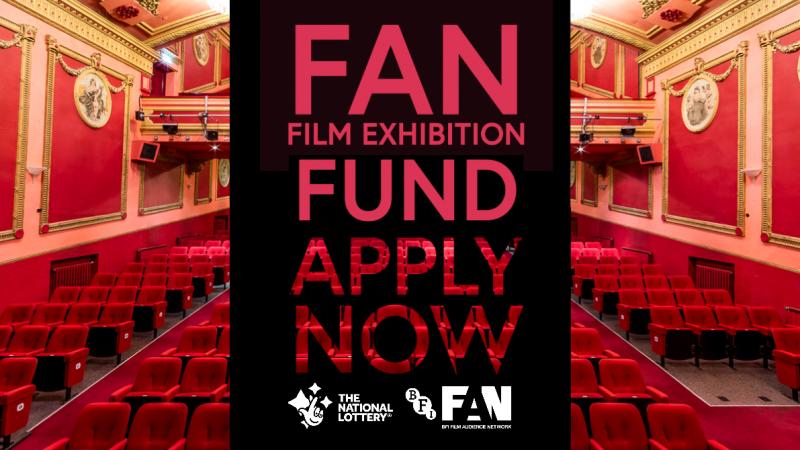
BFI FAN announces new Film Exhibition Fund to bring UK audiences back to communal film experiences
BFI FAN Film Exhibition Fund
BFI FAN announces new Film Exhibition Fund to bring UK audiences back to communal film experiences
The BFI has announced the BFI FAN Film Exhibition Fund is now open, with National Lottery funding available to exhibitors across the UK. The new Fund will support activity to re-engage audiences with collective, big screen film experiences at film festivals, mixed arts venues, and both community and traditional cinemas. As part of a comprehensive package of support for film exhibitors – including the Government’s £30m Culture Recovery Fund for Independent Cinemas in England launched last week – the Film Exhibition Fund will support dynamic cultural programming and activities to engage diverse audiences.
Ben Luxford, BFI’s Head of UK Audiences, said:
“We know the best place to watch film is on the big screen, but the UK’s many indie venues and smaller exhibitors also serve as vital cultural spaces where audiences can connect with their local community, make new and surprising discoveries and be inspired by this most accessible art form in a communal setting. With the generous support of Government and National Lottery, our wealth of film exhibitors are in a position to restart activity, and this funding is there to support them – to continue being brave with their programming choices and to best serve audiences wherever they live in the UK.”
How to apply for the BFI FAN Film Exhibition Fund
BFI FAN is a unique collaboration of eight Film Hubs managed by leading film organisations across the UK, who will each distribute the funding in their region or nation.
This BFI FAN Film Exhibition Fund will enable FAN Members to deliver a broad range of programming once they restart, ensuring excellent British and international independent cinema is available to audiences all over the UK. Other priorities of the Fund are incentivising exhibitors to embed inclusion and environmental sustainability into their approach to reopening, post shut down.
Key dates:
Applications open: Mon 17 August 2020
Applications close: Wed 30 Sept 2020
Activity window: Mid Oct 20 – March 21
Activity can vary in length, scale and format. Members can apply for up to £10,000 (note that there are slight regional variations on this) and support can cover programming, marketing and associated costs.
All proposals must also be able to set out how they will address the BFI Diversity Standards and sign up to the BFI Anti-Bullying and Harassment Principles, as well as demonstrate how they will operate safely during Covid-19, reference can be made to the UKCA’s Cinemas – keeping workers and customers safe during Covid-19 Guidelines.
Due to the limited resources available, and FAN’s commitment to environmental sustainability, drive-ins will not be supported through this fund. Online activity will only be a priority when accompanied by ‘in venue’ work.
Vital support for UK exhibitors impacted by COVID-19
The BFI FAN Film Exhibition is part of a package of support from the UK Government and the BFI, awarding National Lottery funding, to enable many independent cinemas to survive the shutdown which hit arts and cultural venues badly and with immediate impact.
The BFI FAN Resilience Fund opened in April offering £1.3m in emergency funding to exhibitors in critical need as they continued to face months of closure and uncertainty, awarding 130 FAN Members grants ranging from £415 to £23,000 each. The Government’s £30m Culture Recovery Fund for Independent Cinemas in England is now open, providing funding to cover COVID-related health and safety costs, and grants to support independent cinemas operate under the restricted conditions and at limited capacity due to social distancing measures. The UK Government has also provided funding to support cinemas in Scotland, Wales and Northern Ireland, which will be managed by the devolved Government administrations. Funding available to Film Hub Scotland members includes funding from Screen Scotland.
As part of the industry-wide BFI Screen Sector Task Force, the UK Cinema Association led on publishing guidance on the safe operation of cinemas and mobile cinemas. Working safely during COVID-19 in cinemas, which is regularly updated to meet the latest government guidance, is produced in consultation with the Department for Digital, Culture, Media, Public Health England (PHE) and the Health and Safety Executive (HSE).
BFI’s support and recovery strategy for the screen industries
The BFI put in place a package of support for individuals, organisations and businesses across the sector that have been most impacted by COVID-19 (including the BFI FAN COVID-19 Resilience Fund, Production Continuation Fund, Sales Company Organisational Fund and COVID-19 Emergency Relief Fund with The Film & TV Charity for freelancers) and through the BFI Screen Sector Task Force, it continues to work with industry and Government to develop and implement a robust, sector-wide strategy for recovery.
A number of significant initiatives have resulted from the work of the Screen Sector Task Force, including the Culture Recovery Fund for Independent Cinemas in England; a Government funded scheme to support independent film and television production struggling to get coronavirus-related insurance; creating guidance for film and television production to restart and cinemas to reopen, both given the green-light by Government and Public Health England; and the quarantine exemption for film and high-end television cast and crew.
Download the full press release here.
Film Hub Members can apply for the Film Exhibition Fund here.
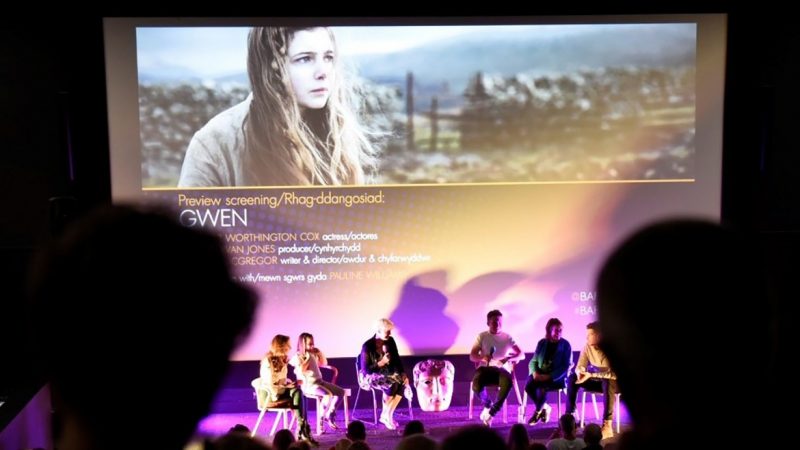
Into Film’s “Cinema’s That Made Me”: Pauline Williams From Off Y Grid, North Wales
With many cinemas still closed due to COVID-19, we’re continuing to celebrate independent venues and exhibitors across the UK in our series Cinemas that Made Me. Below we spotlight Pauline Williams from Off y Grid (Off the Grid), a multi-venue cinema project supported by Film Hub Wales, that aims to reduce isolation and increase engagement with British and independent film.
The Off y Grid project connects a collection of venues across North Wales, catering to rural audiences and celebrating a sense of place and heritage. They provide seasonal programming, with the venues working together to attract audiences. Project Manager Pauline Williams explains how this great collaborative effort benefits audiences and venues across North Wales, and reminisces about the early cinema experiences that continue to inspire her work today.
What does Off y Grid offer audiences?
More people. More films. More spaces. That’s the aim of the Off y Grid (OYG) project. OYG coordinates a unique partnership between seven venues in North Wales that work together in order to promote independent films, British and world films to audiences in rural areas. OYG also offers an array of classic films as well as celebrating Wales’ heritage through film archives.
The seven centres – CellB, Galeri, Pontio, Neuadd Dwyfor, Neuadd Ogwen, Tape Community Music & Film and Theatr y Ddraig – offer different experiences in terms of their location and spaces but share the same mindset with Welsh language culture, heritage and accessibility being central to the provision. By collaborating, we can offer more challenging films to a wider audience. By sharing ideas, we can create new cinematic experiences in the area.
Funded by Film Hub Wales, the project increases activities across North Wales in areas that often suffer from a lack of funding and a lack of artistic events. Our events forge links with the community and offer an artistic provision, encouraging and broadening horizons through film. As well as showing films we offer extra activities (like Q&A sessions) and we coordinate with film festivals and cinematic events in Wales and beyond.
We collaborate with many regular partners, but we are also ready to broaden our horizons with new partners in order to promote films. Recently we have been arranging a pop-up cinema to local communities with the aim of expanding our provision in this field as well as continuing to develop an audience of all ages in the area.
What was your first job in the film industry, and how did you end up managing the Off y Grid project?
After starting my career at the BBC in Cardiff and being trained to work on drama and television series, I moved on to work freelance before joining Gaucho as a producer and collaborating with the director Endaf Emlyn. The production company was a key contributor in the Welsh film industry, and I was responsible for the production of such successful films as Un Nos Ola, Gadael Lenin, and Y Mapiwr as well as individual dramas and series for television.
It’s my love for film and the urge to share that enthusiasm that drives my energy on the OYG project.
Did film and the cinema have an important impact on you earlier in life?
As a child, attending the weekly film club on Saturday mornings at the Majestic in Caernarfon was a magical experience. There was nothing better than waiting in the auditorium for the lights to go down slowly and the curtain to be fully opened to reveal a giant screen. Being in that darkness feeling as if in another world was such a memorable experience. I remember going with my mother to see Summer Holiday and the colours blinding my eyes. But more than that was the feeling that was stirred inside me by such powerful films.
Later I would regularly go the Coliseum in Porthmadog and Forum in Blaenau Ffestiniog (unfortunately none of these cinemas exist now). Nothing can compare to being partly in darkness and being whisked away to another world. There are no limits to the imagination. Cinema’s influence on my early years was most definitely key to my career choices.
How have those venues affected how you work today?
The experiences I had watching films on the big screen and losing myself in another world in local, community cinemas inspires me to offer similar experiences to today’s audiences. Going to the cinema was a regular, affordable experience and the programming was varied in such a way that meant that audiences could enjoy all types of films, and all on their doorstep.
Watching a movie on the big screen is a magical, enchanting experience. Being part of an audience that experiences a common emotion is an inclusive, mystical feeling. A film can make us marvel. It offers a key to other worlds. It evokes emotions. It is inclusive and transformative.
While Off y Grid venues have been closed due to COVID-19, have you begun any new initiatives to reach audiences at home?
CellB have been working assiduously to maintain and promote Gwallgofiaid (a not-for-profit that provides training for young people) by arranging online sessions with Rhys Ifans as a mentor for a short film making project.
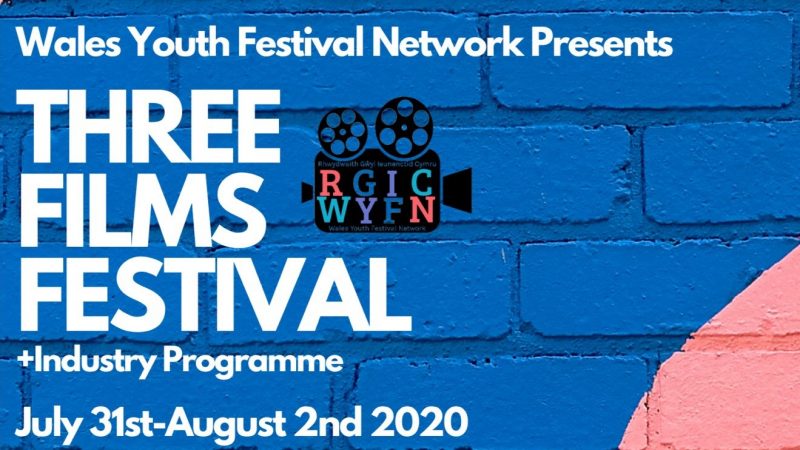
Three Films Festival
Watch The Three Films Festival online Friday 31st July – 2nd August
In this period of challenge and uncertainty for the creative industries, film Festivals in Wales have responded by coming together to promote the importance of Festivals in our communities and provide a new national and international platform to celebrate young talent in Wales. This initiative has been led by the Wicked Wales International Youth Film Festival in Rhyl and supported by Film Hub Wales as part of the BFI Film Audience Network (FAN), made possible by the National Lottery.
First Minister for Wales Mark Drakeford MS/AS says:
“At a challenging time for the arts, it is inspiring to see Welsh film festivals coming together to give young film makers this opportunity to share their creativity.
“The creative industries sector is one of the fastest growing in Wales and we are very proud our country is recognised as a centre for film and TV production. Innovative events like this will help to nurture the incredible pool of future talent we have, even in the most difficult circumstances.
“I would like to wish the Three Film Festival the very best of luck and congratulate Wicked Wales and everyone who has brought this to life.”
Festivals from all corners of Wales have joined together in a new Wales Youth Festival Network WYFN. The WYFN Network is being launched with a new national ‘Three Films Festival’. The Festival will screen up to three films from each of the many established film festivals in Wales and has also welcomed films from S4C, Hijinx and Into Film. The films screened have all been made by or for young audiences aged approximately 15-25.
The Festival this year will be online and will take place between Friday 31st July and Sunday 2nd August. The programme will include film screenings and an industry programme supported by Film Feels Connected on aspects of filmmaking.
Lorraine Mahoney, WYFN Coordinator says:
“Three Films Festival demonstrates the commitment by film festivals across Wales to want to help support and develop the next generation of cinema goers and filmmakers with this inspiring online showcase of films and events. It is a coming together and a celebration of the work begun by WYFN and its film festival partners, who are all working together to screen a wider range of films to young audiences in Wales.”
Rhiannon Hughes, Director of Wicked Wales Festival adds:
“Wicked Wales Festival has benefited enormously from belonging to an international youth film festival network ‘Youth Cinema Network’ (YCN) in terms of sharing ideas and best practice, collaborating on projects and raising funds together. It was this experience which we wanted to introduce to Wales to strengthen support for Festivals in Wales. We are grateful for the support of Film Hub Wales who have worked with us for a number of years to develop the new network.”
Mark Williams, Iris Prize Outreach and Education Manager:
“We’re delighted to be sharing some of the films we have made with young people. We’ve been inspired by the creative talent we have here in Wales, as our next generation of filmmakers begin their journey. We hope people enjoy watching these films as much as we’ve enjoyed making them.”
The full festival programme is available on the www.wickedwales.com website and WYFN Facebook page.
Follow twitter @wales_youth for regular updates and subscribe to the YouTube festival channel to watch the free online film festival. And visit their facebook Wales Youth Festival Network or Wicked Cinema
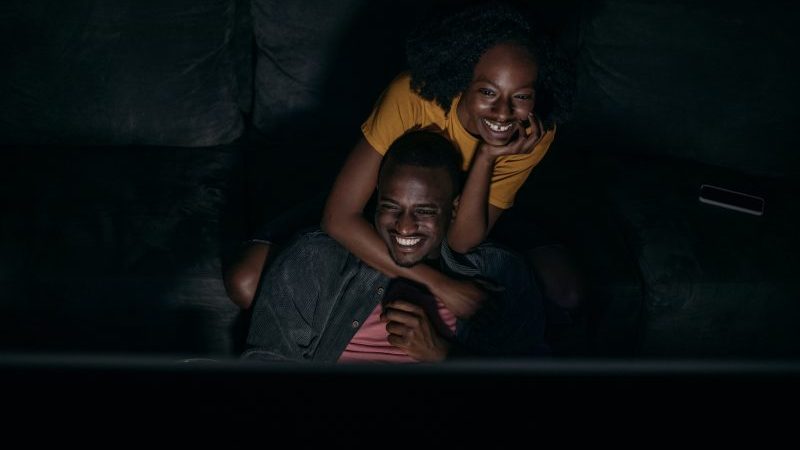
Film Feels – Connecting film fans with online cinema
UK-wide film programme, Film Feels Connected, brings a whole new dimension to lockdown for film fans
Streaming services added 4.6 million subscribers in the first eight weeks of UK lockdown. As we’ve acclimatised to COVID-19 restrictions, a major season of film from the BFI Film Audience Network has been giving film fans a whole new world of film to explore.
Bringing together more than 50 programmes from UK cinemas, festivals and film societies, the season offers UK film fans new ways to connect with unique, bespoke and diverse film screenings and special events, beyond the tried and tested streaming platforms.
Upcoming highlights include:
- Africa in Motion: Looking Back, Reaching Forward, August 2020. Screenings of classic and contemporary African films, plus discussion to explore and critique, representations of Blackness on-screen.
- Doc‘n Roll Film Festival: We Out Here Festival x Doc‘n Roll, 19-22 August. This partnership between Doc n Roll and Gilles Peterson’s We Out here Festival will present Music docs + Q&As exploring Black excellence and anti-racism in British music history
- Kino Klassika: Klassiki – Cinema on the Hop, May-August 2020. An online weekly curated selection of Soviet, Russian, Caucasian and East European cinema from early silent cinema, to masterpieces of animation, from post-war classics to contemporary Cannes winners. Coming up in August is Tashkent Film Encounters: a season of rare gems from Central Asia.
- Matchbox Cineclub: Tales from Winnipeg 28-31 August. Matchbox present a limited season in collaboration with the Winnipeg Film Group, including rare and exclusive work from John Paizs, Guy Maddin, Kevin Nikkel & Dave Barber. The season and all additional content will feature brand-new SDH/captions for D/deaf audiences.
- Pilot Light TV Fest: Season 5, the Digital Special, 15-16 August. Presenting 23 brand new TV Pilots and web series for audiences to obsess over, as well as meeting the talent behind them with a selection of Q&A’s and video introductions.
- Slapstick Festival: Laughter Out of Lockdown, April-August 2020. All your classic comedy needs from silent short films to Comedy quizzes and Q&As featuring comedy legends Robin Ince, Lucy Porter and Rob Brydon
Film Feels is a National Lottery funded project designed to bring new, off-the-beaten track, films to those who have spent lockdown completing Netflix, searching every corner of Amazon Prime for something a bit different or have had all the Disney+ they can handle.
This summer, Film Feels Connected invites audiences to join in with over fifty online film events; ranging from watch-alongs to live conversations with directors, filmmakers and critics, to film festivals, workshops and at-home creative activities.
We’re spending almost three hours a day watching TV and films during lockdown2,” said Annabel Grundy, Film Feels Connected project lead, “so Film Feels Connected adds a whole new dimension to the kinds of things readily available. From Russian cinema to Japanese animation, award-winning short films, queer cinema and much needed comedic relief, we’re working with organisations and cinemas all over the UK who are selecting films they love, to share with audiences online.
Although cinemas were given the green light to open in England on 4 July, many smaller independent cinemas in the UK, unable to open at reduced capacity, are making plans to reopen later in Summer and the early Autumn.
Greg Walker, Festival Director at Pilot Light, one of the Film Feels Connected participating organisations, says:
COVID-19 has thrown many organisations a curveball with their physical festival delivery, so we’re very excited for the opportunity to connect with new and existing audiences online with our eclectic selection of TV Pilots and Web Series. We hope this format keeps our loyal audiences coming back and, also reaches new people around the country hungry to discover fresh, diverse & talented voices working in and breaking through Indie TV.”
The team behind Film Feels Connected hope that while the cinemas are dark over the summer, curious film fans will visit the Film Feels website and take a risk on some true cinematic gems. All chosen by respected cinema programmers, film festivals and cinephiles who want to share their passion for cinema.
Independent venues and festivals really care about their audiences, and so many organisations have quickly pivoted to an online programme, to connect with people and try new ways of working even in the face of challenge and uncertainty. From community film club watch-alongs to experimental programmes of new work from arts collectives, the opportunity for audiences to discover and share new films and experiences is alive and well,” says Annabel, “plus, the chance to get closer to the directors and writers behind the films with online discussions and interviews, is greater than ever before; particularly for those who are isolated or unable to access physical venues at this time. Film still has the power to connect us all.
Visit filmfeels.co.uk to find out about the all the films and events you can join in with over the summer.
